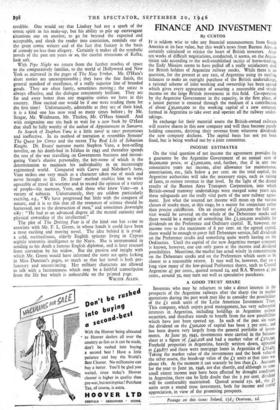FINANCE AND INVESTMENT
By C USTOS IT is seldom wise to take any financial announcement from South America at its face value, but this week's news from Buenos Aires is certainly calculated to rejoice the heart of British investors. After ten weeks of difficult negotiations, conducted, it seems, on the Argen- tinian side according to the well-established tactics of horse-trading, the Eady Mission seems to have pulled off a really satisfactory deal for British holders of Argentine railway stocks. While there is no question, for the present at any rate, of Argentina using its sterling balances to make an outright purchase of the British undertakings, a rational scheme of joint working and ownership has been agreed which gives every appearance of assuring a reasonable and steady income on the large British investment in this field. Co-operation by the Argentine Government in the capacity, in the first place, of a junior partner is ensured through the medium of a contribution of about L3o,000,000 to the working capital of a new company formed hi Argentina to take over and operate all the railway under- takings.
In exchange for their material assets the British-owned .railways will receive shares in this new company and will then become purely holding concerns, deriving their revenue from whatever dividends the new company declares. The capital basis has not yet been fixed, but is being worked out by a joint committee.
INCOME ESTIMATES
On the vital question of net income the agreement provides for a guarantee by the Argentine Government of an annual sum of 8o,000,000 pesos, or £5,000,000, and, further, that if in any two consecutive years net income, after allowance for maintenance, amortisation, etc., falls below 4 per cent. on the total capital, the Argentine authorities will take, the necessary steps, such as raising of fares, to restore revenue to that level. In the light of the dismal results of the Buenos Aires Transport Corporation, into 'which British-owned tramway undertakings were merged some years ago, these safeguards are the really vital parts of the new railway agree- ment. Just what the assured net income will mean on the various classes of stocks must, at this stage, be a matter for conjecture rather than precise calcination. On an income of £5,000,000 the full ser- vice would be covered on -the whole of the Debenture stocks and there would be a margin of something like Li,soo,000 available for dividends on the Preference and Ordinary capital. If, however, net income rose to the maximum of 6 per cent. on the agreed capital, there would be enough to cover fa Debenture service, full dividends on the Preference stocks and something quite worth having on the Ordinaries. Until the capital of the new Argentine merger company is known, however, one can only guess at the income and dividend possibilities. Meantime, the market has acted wisely in concentrating on the Debenture stocks and on the Preferences which seem to be closest to a reasonable return. It may well be, however, that on a long view many of the low-priced Preference shares, such as Central Argentine 41 per cents., quoted around 24, and B.A. Western 41 per cents., around 5o, may turn out well as speculative purchases.
A GOOD TRUST SHARE
Investors who may be reluctant to take a direct interest in the prospects of the Argentine railways after the sharp rise in market quotations during the past week may like to consider the possibilities of the Li stock units of the Latin American Investment Trust. This company, which enjoys good management, has very substantial interests in Argentina, including holdifigs in Argentine railway securities, and therefore stands to benefit from the new possibilities which have just been opened up. In each of the past six years the dividend on the £500,000 of capital has been 3 per cent., and has been drawn very largely from, the general portfolio of invest- ments. At June 3o, 1945, investments were carried in the balance- sheet at a figure of £441,028 and had a market value of £370,390. Freehold properties in Argentina, heavily written down, appeared at £49,877 and there were mortgage loans in Argentina of £20,423. Taking the market value of the investments and the book value of the other assets, the break-up value of the Li units at that time was about as. At the moment it can scarcely be less than Li. Accounts for the year to June 3o, 1946, are due shortly, and although to some small extent income may have been affected by drought conditions in Argentina, there can be little doubt that the 3 per cent. dividend will be comfortably maintained. Quoted around I5s 9d., the p units seem a sound trust investment, both for income and capital appreciation, in view of the promising prospects.


























 Previous page
Previous page